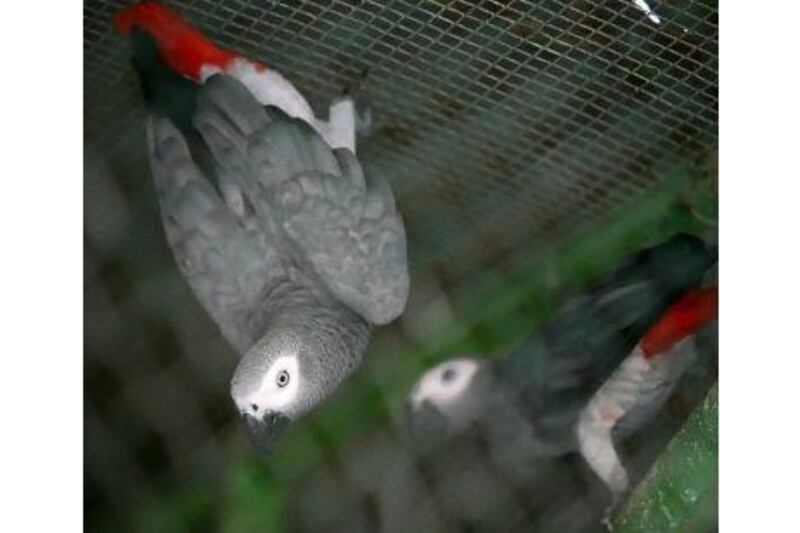ABU DHABI // Lions and tigers are among the rare species that have been imported legally into the country this year, the organisation that regulates wildlife trade has revealed.
Falcons and parrots were the most commonly traded animals, according to the Convention on International Trade in Endangered Species (Cites). Another common import was agarwood, which is used to make oud, and some monkeys and snakes were also brought in.
Video: UAE playing key role in steming illegal animal trade
June 01, 2011 UAE
The UAE is playing a key role in containing the flow of illegally traded wildlife from war-torn Somalia, according to the International Fund for Animal Welfare.
A total of 1,360 permits to import, export and re-export animals and plants have been issued in the past six months. Eighty per cent of the permits were for imports, 15 per cent for re-exports and 5 per cent for exports.
The documents cover species that appear on Cites's threatened, endangered and protected lists, and allow traders to legally import or export specimens, many of which come from captive breeding centres.
The aim is to ensure the international trade in wild animals and plants does not threaten their survival. In the UAE, the scheme is run by the Environment Agency - Abu Dhabi, the Ministry of Environment and Water and the Federal Environment Agency.
"We have a large variety of species that come in and out of the UAE," said Abdul Rab Al Hamiri, the assistant director of Cites and deputy director of inspection and environmental compliance at the Abu Dhabi environment agency. "The majority of animals come from Germany and South Africa where they have a lot of captive breeding programmes.
"Falcons were the most traded species along with agarwood and some other sorts of birds such as parrots. Agarwood is a Cites-listed species so it requires the same papers as any of the animals listed in the convention. Most agarwood comes from trees in the wild, though some are grown in plantations in Indonesia and Malaysia.
"Countries that export agarwood have to get an annual quota for the amount they export around the world, so they have to issue an export permit from their side and we have to issue an import permit from our side before they can move the shipment."
However, shoppers buying oud in the malls need not worry about documentation.
"The shop needs a permit but people who buy oud are not breaking any law," Mr Al Hamiri said. "Cites generally applies when you move across borders and there is a personal quota of 250gm to move oud from one country to another that doesn't require any papers."
Some shipments of ivory were brought into the country. The international trade in ivory was banned in 1990 but there are some circumstances where buying and selling are allowed.
"There are some legal movements of ivory; they involve confiscated stock that some countries are allowed to sell to Japan or China and some pre-convention ivory."
Mr Al Hamiri said a number of different species were exported from the Emirates.
"They include falcons because we have falcon farms here, and some parrots as we also have breeding programmes for them. Also houbara bustards, we breed them, as well as oryx and some types of deer - but nothing taken from the wild, they are all bred in captivity."
The highest number of permit applications comes from Dubai, followed by Abu Dhabi. Many are issued to research centres, circuses and zoos, and each costs Dh200. Last year 3,430 permits were issued.





